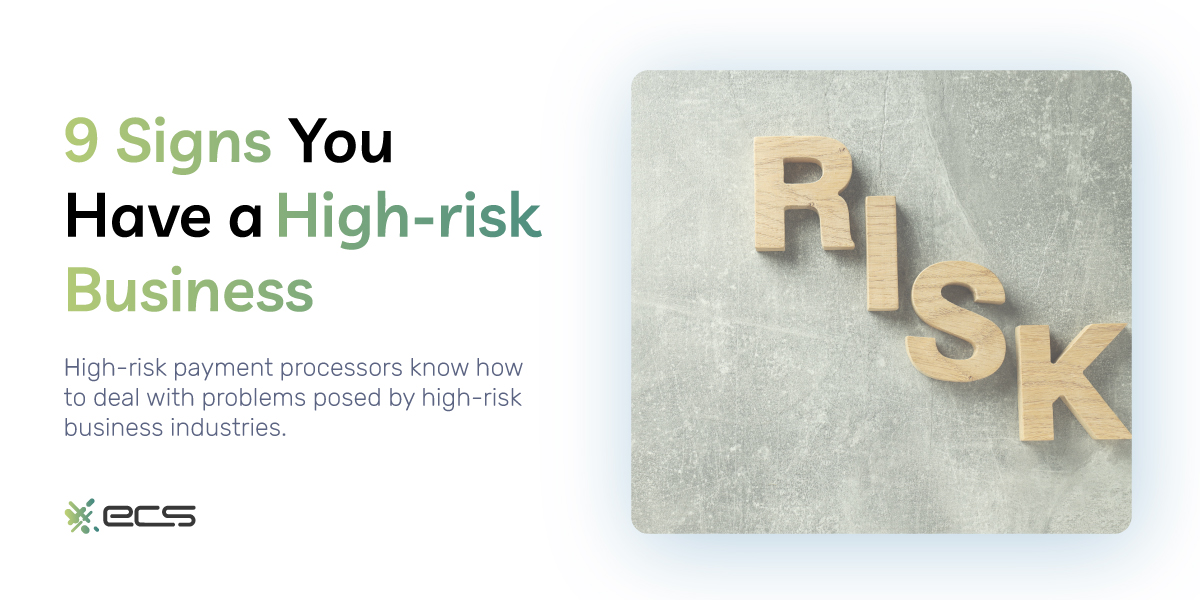Looking for a new payment processor, but not having any luck? You might be a high-risk business. But what is high-risk credit card processing, anyway?
high-risk businesses are so-called because they present a risk to payment processors. The business itself might be risky (startup, bad credit history, lots of chargebacks). Alternatively, the industry itself might attract crime or legal issues (gambling, drugs, adult entertainment).
Self-reflection is a hard thing to do, on a personal level and in terms of business. That’s probably why people hire coaches to help them reach personal milestones, and analysts to crunch the business numbers.
You might not see anything inherently wrong with your business. And there probably isn’t, per se. But if your business can relate to any of the following concerns, know that these are red flags to payment processors and their sponsoring banks.
#1: You Specialize in What Society Might Term Vices
No judgment here, but if your business involves things like tobacco, alcohol, gambling, or adult entertainment, you will need a high-risk credit card processor who can provide a high-risk account for digital payments. In many states, you will need a special license to purvey these goods or facilitate these activities.
And in some states, they are forbidden, either entirely or in terms of purveying online. For example, at the time of this article, online gambling is only legal in seven states (and Nevada is not one of them, aside from poker).
You might think you can get around this issue by selling your goods or services through a platform, but no dice there. On the one hand, these platforms will kick you off. While your bathtub-brewed bourbon may be blindingly bomb, Etsy won’t allow you to sell it.
Financial institutions like to stay away from business models that do not have a uniform regulatory landscape across all 50 states. As such, a business owner in any of these areas will not be able to use a payment aggregator like Paypal, Venmo, Stripe, or Square.
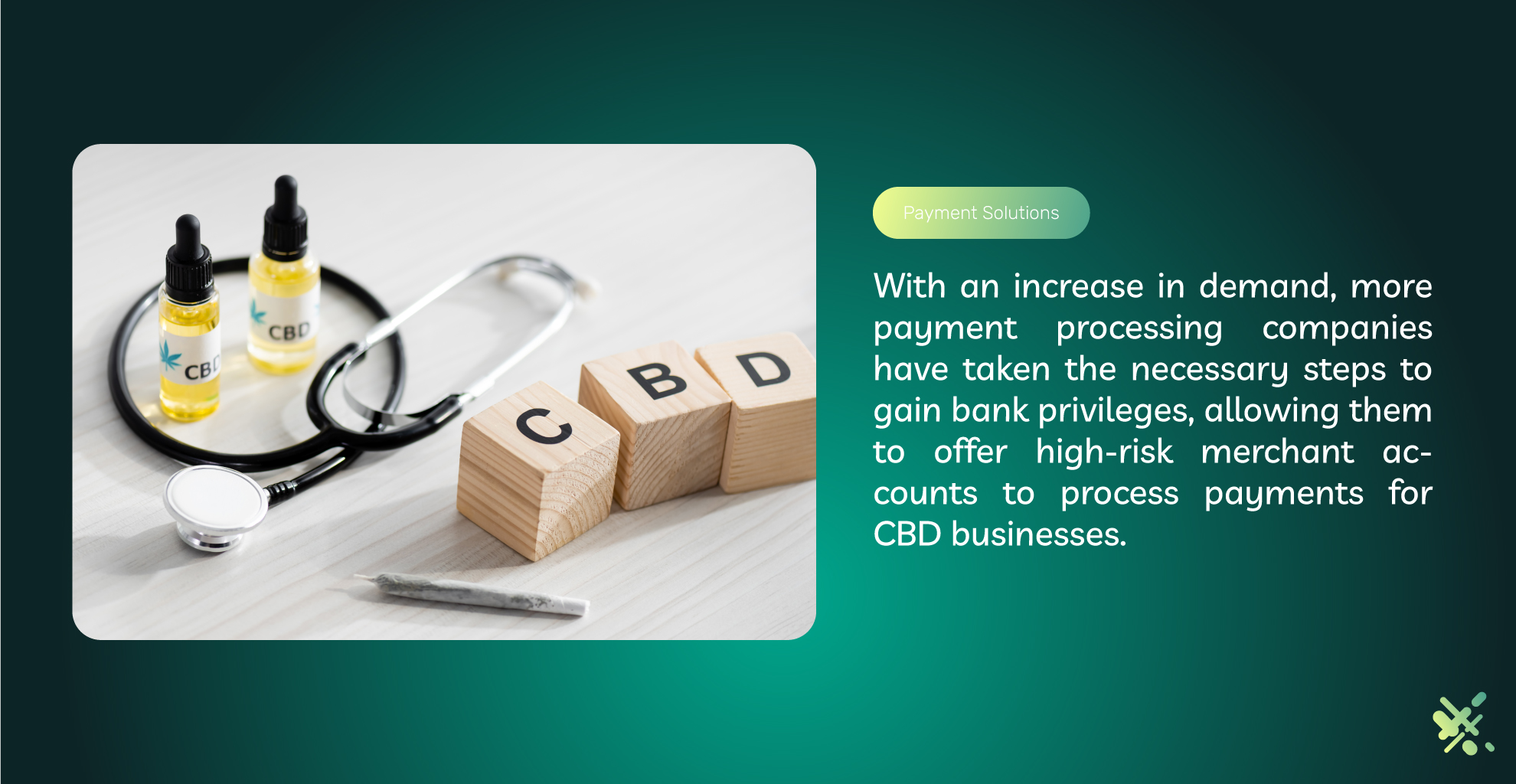
#2: Your Product is A New Frontier
If you’re going boldly where no man (or woman) has gone before, you’ll also have trouble securing normative merchant services. One of the biggest examples of this type of space in high-risk businesses is the marijuana and CBD industry. As Mary Jane becomes recreationally legal in more states, economies are expanding for local and small business owners.
A related industry circulates around cannabidiol oils or CBD. CBD products have a number of touted health benefits that range from treating mild depression to alleviating severe PTSD. However, the long-term macrocosmic and microcosmic effects of legalizing pot and pot-related products have not yet been seen. As such, payment gateways view it as a higher-risk business.
Vaping is a related new frontier. Vaping was once (and still is) touted as a healthy alternative to consuming tobacco through smoking. However, consumers have quickly seen that vaping has its own set of dangers, which in rare cases includes the risk of death (for instance, through unregulated products). As such, there’s a chance that vaping may be a short-lived industry in some states—not an attractive proposition for payment processing.
There’s also a chance that unproven, untested products could develop into a class action lawsuit down the road. For instance, the United States Justice Department sued tobacco companies to recover billions of dollars in damages. A payment processor does not want to even remotely touch anything that could spell out legal trouble, now or in the future.
#3: Your Business is a Multi-level Marketing Model
In this type of business, customers become part of an evangelical sales force. As the base of the sales pyramid expands with an influx of customers-turned-salespeople, the individuals at the top build their residual income.
It sounds appealing, but the reality of the MLM business model is much different for the average individual. Nonetheless, it is an appealing way to leverage extant resources for marketing purposes. But this type of business model often exposes itself to customer frustration, particularly chargebacks.
Around 90% of participants drop out in the first year. Around 80% of the participants lose money. And the product return rate hovers around 30%. We say this not to discourage you from pursuing your dreams, but to call your attention to the reality that you will be bracketed among other high-risk companies.
The aforementioned chargeback happens when a customer reaches out to their bank or credit card company to reverse a charge. If a consumer has had a frustrating experience with an MLM salesperson, they may skip requesting a refund and go right to their bank. The result is lots of chargeback fees for the umbrella business. And the long-term prognosis for such a pattern is getting labeled as a high-risk business.
#4: You’re Crazy About Being Healthy
That seems rather ironic, probably. You’d expect to get rewarded for eating your fruits and veggies…and especially for encouraging other people to eat theirs. But not when it comes to business. In fact, supplements and nutraceuticals are viewed as high-risk businesses according to most payment processors.
Supplements may purport to aid in general health or treat a specific condition. In contrast to drugs produced by pharmaceutical companies, they use natural ingredients or extracts of natural ingredients. But unlike lab-made drugs, they are not tested by the FDA. That’s because non-clinical FDA approval can cost $1.6 million, while approval accompanied by clinical studies can top $3 million.
Startup companies selling a secret mix of herbs and spices (and not the ones coating fried chicken) usually do not have the capital for this seal of approval. As such, the product is unproven. There may be bad actors in the general supplement economy, purveying a contemporary version of Wild West Snake Oil.
And regarding supplements that are vitamin or diet-related, there is no process for FDA approval anyway, because the FDA considers it food. All of this poses a risk for payment processors. High-risk payment processors will be needed to service these types of accounts if these merchants want to get paid.
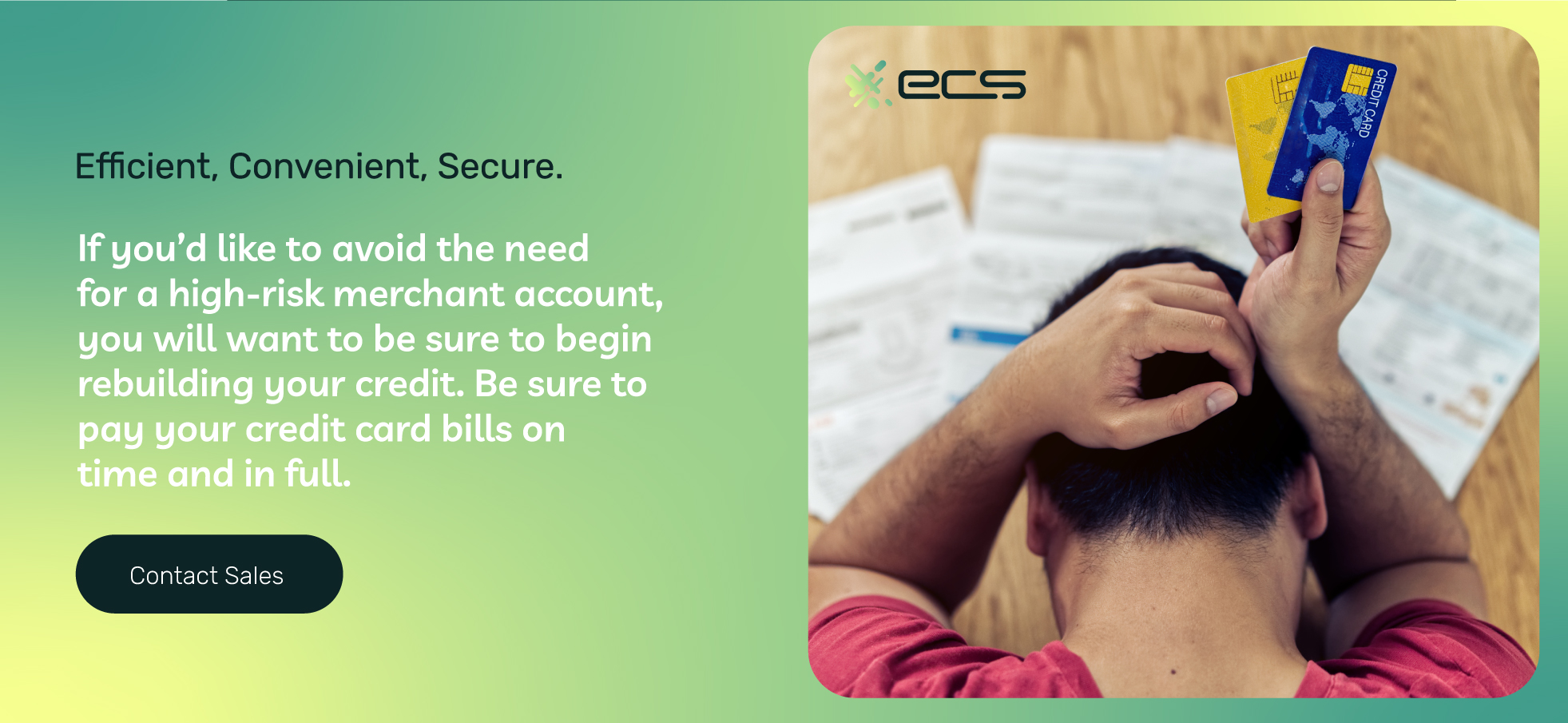
#5: Your Business Has a Lot of Debt
Nobody likes to be in debt. The fact of the matter is that most businesses have debt, not just high-risk businesses. But giant corporations and small business owners as well. Unless you have a goose that lays golden eggs, you will likely need to borrow money to start or expand your business.
However, if this debt gets out of hand, it will threaten the viability of your business. You may need to reduce your workforce, close a location (or several), and cut back on inventory. Some of these activities can impact your sales volume, which in turn impacts your payment processor.
You might be wondering why a payment processor would care if your business stays afloat. They’ll still get a percentage of every sale, so why should they care about your credit score? And if your business does go bankrupt, they’ll just find another merchant to service…right?
Keep in mind that your payment processor is also a business. They have a limited supply of hardware and manpower to service their accounts. If an account that initially seemed lucrative becomes a dud, it’s taking up resources that could be put to better use. As such, many payment processors will view an indebted business as a dangerous proposition.
If you’d like to avoid the need for a high-risk merchant account, you will want to be sure to begin rebuilding your credit. Be sure to pay your credit card bills on time and in full. Try to utilize less than 30% of your available credit. And remember, only make purchases you can actually afford. If you see no way of ever paying funds back, figure out a better financial way to get what you need.
#6: You Don’t Go Back a Long Way
B2B investments—like a payment processor setting up infrastructure to service your business—often require some demonstrable history. It’s sort of like when a consumer applies for a credit card, and a bank wants to see how they are about borrowing money.
A payment processor will want to see a payment history and a credit history for a business. These histories can help a merchant services provider gauge company leadership.
Does the payment history contain a high percentage of chargebacks? That might indicate some poor customer service. Conversely, if chargebacks are low, it’s an indicator that company leadership is good.
But if there’s no history to look at, a payment processor does not know what they’re getting into. Whether it’s credit history or payment history, payment processors won’t have a good gauge of how a B2B relationship will pan out.
If your business does not have either, you’re probably in the very first phases of growth. Many small businesses in this category run their sales through a platform like Shopify. But for those who want to set up their own arrangements, they’ll need to find some credit card processing for high-risk merchants.
#7: Your Products Are Invisible
Businesses selling digital products often require a high-risk merchant service. This is because (among other concerns) the nature of the product makes it more susceptible to eCommerce chargebacks. One issue is that cloud-based software products tend to operate on a subscription model.
A customer may decide they no longer want to pay for your digital product. If it’s hard to contact you or your customer service department, they may reach out to their bank (card issuer) instead. Alternatively, they may discover that their cancellation is too late to reverse the most recent billing. Upset, they will reach out to their credit card company or bank for a dispute.
Digital products can also be subjected to friendly fraud. The consumer may claim that someone in their household unintentionally downloaded the product, or that the product did not download properly (making it unusable).
During the dispute process, banks (and card networks, if it ultimately comes down to that) are not going to subpoena the end user’s computer as a piece of evidence. The merchant is left with little recourse to contest the chargeback.
When it comes to tangible, delivered products, businesses can now request the parcel delivery service to photograph their delivery, which eliminates many cases of friendly fraud. The same is not true of digital product delivery unless the merchant is using an application that can prove the delivery of the product.
Even though these applications are available, generally speaking, digital products are still prone to chargebacks. For instance, a customer may contest that a course, class, or eBook did not deliver on its promise. They may then choose to initiate a dispute. For all these reasons, purveyors of such products are viewed as high-risk businesses.
#8: Your Business May Attract Crime
This one might seem obvious. But the fact of the matter is that some businesses are still necessary, even if they attract crime. Any business selling low-ticket items and collecting substantial amounts of cash is a high-risk business because they are magnets for crime. Examples include laundromats and convenience stores.
Bail bonds are another business that may attract criminal elements. Misery attracts company, as they say, and there will be times when criminal cohorts pay up to release their partners in crime. Situations like this can involve money laundering or money obtained from illegal activity (such as extortion or drug sales).
In a related vein, there is credit repair. There is nothing criminal about credit repair, but the nature of the business attracts people who have a hard time paying their bills. This inconsistency is a risk for payment processors who could be faced with insufficient funds, bounced payments, and chargebacks primarily meant to desperately recoup money.
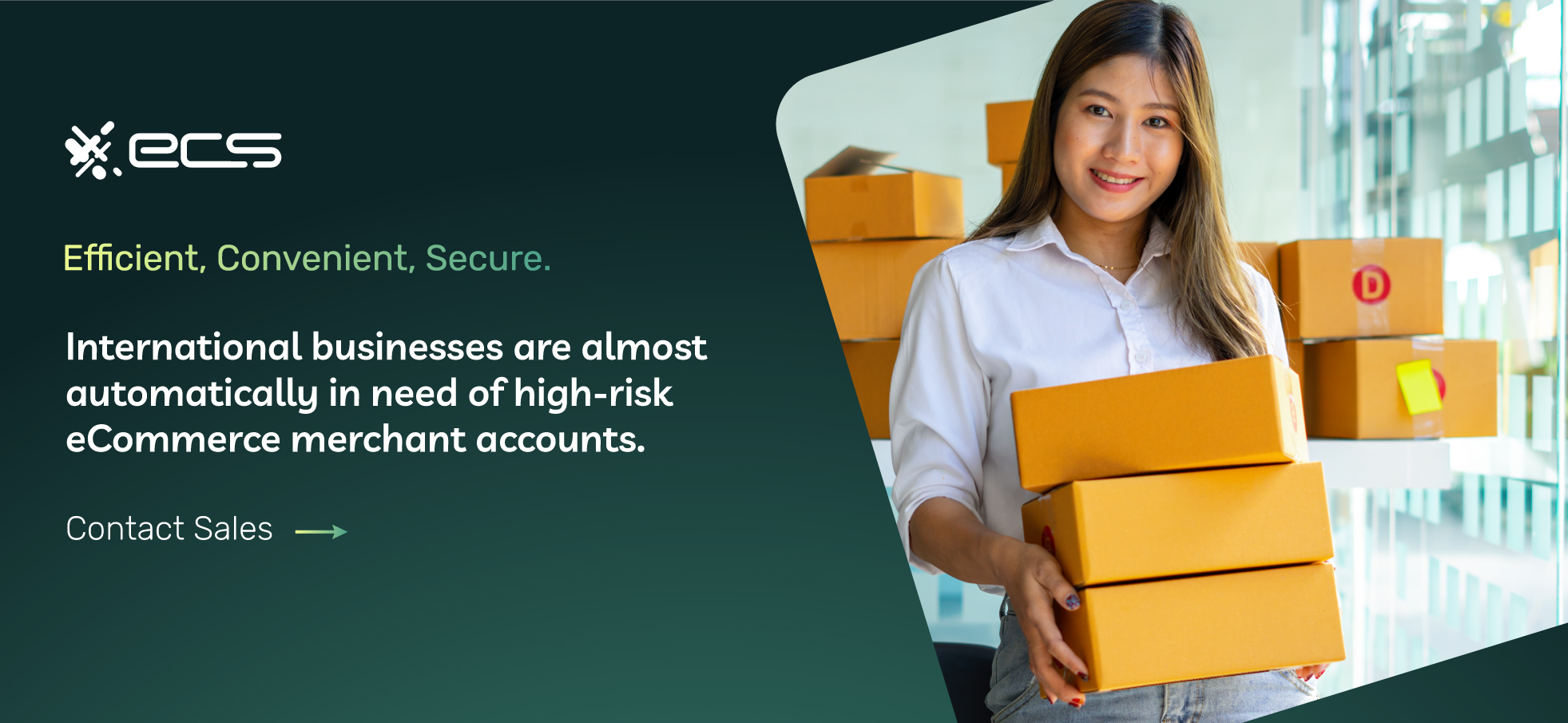
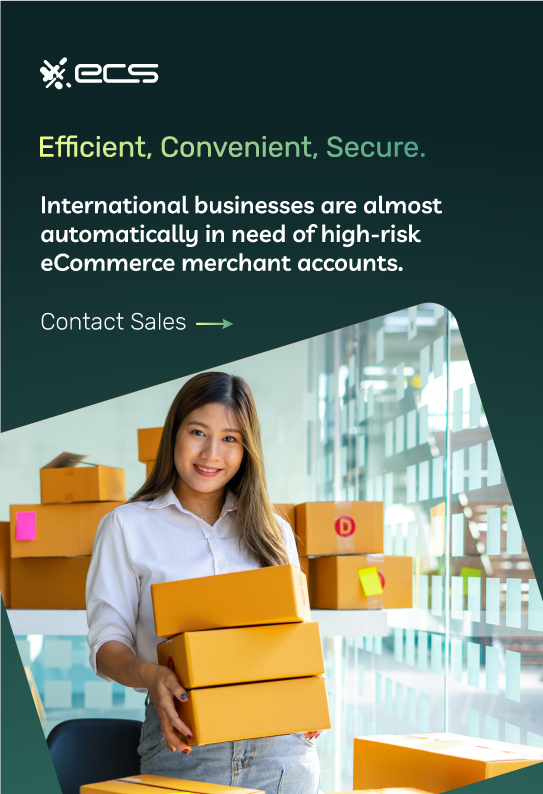
#9: Your Business is International
International businesses are almost automatically in need of high-risk eCommerce merchant accounts. That’s because a substantial amount of financial crimes are perpetrated outside the United States. If you’re wondering where much it comes from, look no further than Nigeria, Ghana, India, Indonesia, the Philippines, and Romania.
In any case, selling and shipping your products to international addresses may involve fraudulent purchases. And for honest purchases, there may be complications in the shipping and delivery. Merchants selling internationally online will find that there is no such thing as a Shopify, Square, or Stripe high-risk business account.
These companies do not offer high-risk payment gateways. That means that the merchants who sell internationally will need a high-risk payment processor. One of the biggest reasons, as mentioned, is that international commerce is just a credit card high-risk situation. Someone ordering your product in (insert your favorite country) may have hacked into an American cardholder’s payment information and used it to place an order.
International fraud is more common than you think. In fact, fraud on a global level costs the world economy more than $5 trillion annually. As such, this is one statistic that payment processors do not want to participate in.
So Now What?
Okay, so perhaps one of these red flags relates to your business. You’ll need a high-risk pay solution. But the question remains: what is high-risk credit card processing…and how is it different from normal or “low-risk” payment processing?
To answer that question, let’s first look at companies like Shopify, PayPal, and Square. These are common solutions for merchants with a low sales volume. Often these types of merchants are just getting started in their business.
First off, Shopify will not let you sell certain products online. And if any of these other red flags apply, they won’t let you use their built-in payment gateway (which is actually operated by Square). These large payment gateways are actually payment aggregators. A payment aggregator bundles all their merchant customers under their own merchant ID.
As such, they cannot afford to have any bad apples in the bunch. Since that’s the case, any business that looks like a bad apple won’t even be allowed in the bucket. And by the way, apples that suddenly turn bad (a surprise chargeback increase) will be tossed without ceremony. To add insult to injury, they may charge termination fees.
How Are High-risk Payment Processors Different?
high-risk payment processors know how to deal with problems posed by high-risk business industries. They might mitigate their risk with high-risk merchant account fees. However, these fees are not necessarily going to be higher than the flat-rate pricing offered by behemoth gateways.
Many of these companies have flat-rate processing fees that do not really reflect the true cost of running a transaction. As such, merchants are paying a lot more than they should. Even if a high-risk payment processor has to charge more to cover their own risk, it might still end up costing less than using (say) PayPal.
Merchant services for high-risk businesses may also mitigate their risk by requesting a rolling reserve. This is an amount of cash the business lets the processor keep on hand, to cover the cost of chargebacks. Over time, the processor releases funds back to the merchant.
Without the help of a high-risk payment processor, certain businesses could not collect payment. If any of these above-mentioned signs relate to your business, you may need a high-risk merchant services provider. We’re happy to answer any questions about high-risk merchant processing and how it can help your business. Give us a call or fill out the contact form below.
Frequently Asked Questions About High-Risk Businesses
High-risk businesses simply mean there is more financial risk for payment processors to support your credit card settlements. This does not mean you cannot process digital payments. ECS Payments is backed by banks who accept high-risk merchant accounts and is happy to discuss your payment solution needs.
Several factors can indicate that your business is high-risk, including the nature of your industry, federal and state-wide regulations regarding your products or services, the potential for chargebacks, and more. If your business can relate to any of these concerns and you’re in need of payment solutions, contact ECS Payments for guidance.
High levels of business debt can pose challenges, and payment processors may view it as a risk. If you’re worried about how debt might affect your payment processing options, contact ECS Payments for advice on managing your payment processing needs.
High-risk merchant accounts are not hard to obtain. However, there may be higher fees involved when compared to traditional payment processing. The fact of the matter is that avoiding digital payment acceptance would harm your potential profit margin, and therefore, you must find a way to legally accept high-risk digital payment.
